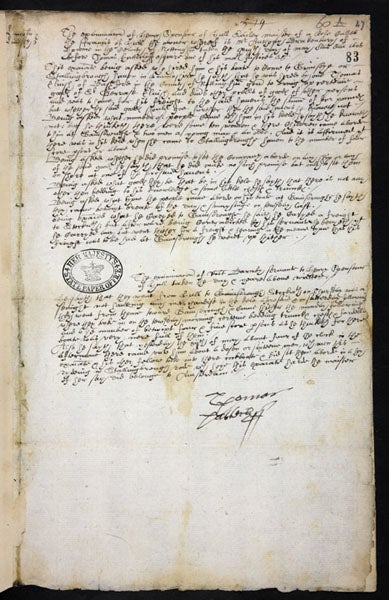
TranscriptionThe examinacion of Henry Spensour of Hull sailor maister of a kele called the Francis of Hull the owner whereof of is Mr Anthony Brackenbury of Howme in the county of Nottinghm taken the xiiith day of May Ano dni 1608 before Thomas Hatteclyff esquier one of his majt Justices &c[1] The examinate being asked who hired him & his boate to come to Grimsbye or Stallingbrough haven in Lincolnshire he sayth he was hired by one Thomas Elvish of Basford in the county of Nottingham gen to bring up certaine goods of Sir Gervase Elvish [2] and divers other parcells of goods of other persons and was to have for his freight to the said havens the summe of four pounds but whether the said goodes should go further than the said havens he knoweth not being asked what number of people came with him in his keele he sayth he knoweth not: but he thinketh there were some ten women & three children came abord him at Gainsbrough & two men a young man & an olde. And it is affirmed yt there was in his kele when he came to Stallingbrough haven to the number of four score persons or above. Being asked whether he did promise to set the company abord on any ship or any of the said goods he sayth that he he did make no such promise but only to set them on shore at one of the foresaid havens. Being asked what goods they be that be in his kele he sayth that there is not any other than bedding to his knowledge & some little chests & trunks. Being asked what tyme the people came abord on his boate at Gainsbrough he sayth they came betwixt break of the day & [?] on tewsday last. Being examined what he caryed to Gainsbrough he saith he carried a freight to Stockwith [3]: but after ward being contradicted by his servant he denyeth yt he carryed any but went thither for a freight & hearing in the meane tyme that his freight was to be had at Gainsbrough he went up thither. The examinacion of Robt Barnby servant to Henry Spensour of Hull taken the day & yeare above written:[4] he sayth that they went from Hull to Stockwith on Thursday was a senight [5] not haveing any merchandise in the kele aforesaid & on Satterday following they went from thence toward Gainsbrough & came thither the Monday following where they tooke in on the tewsday morning certeine bedding trunks chests & fardells and to ye number of betwixt four & five score persons as he thinketh for there boate was very nere full of them. Also he sayth that yesterday the xii th of may about four of the clock in the afternoone there came unto him about a dozen or sixteene men, which men this examinate & his other fellow tooke into there cockboate & did set them aborde in a hoy[6] a doing in Stallingbrough which hoy this examinate heard the maister of her say did belonge to Amsterdam. Thomas Hatteclyff [1] Mentioned in local customs records, the Francis of Hull was a 50 ton vessel which plied her trade between Grimsby and the River Thames. In this deposition, her master Henry Spencer describes a group of Separatists boarding the boat at the market town of Gainsborough, on the River Trent. [2] Born in about 1561, Sir Gervase Helwys was the cousin of Thomas Helwys. An important landowner in two counties, Sir Gervase had Puritan sympathies and served as Sheriff of Lincolnshire. His life ended on the scaffold. After unwisely attending the court at Whitehall, he became Lieutenant of the Tower of London, where he was implicated in the poisoning of Sir Thomas Overbury. He was hanged on Tower Hill in 1615. [3] Stockwith is another mall haven on the Trent, about two miles north of Gainsborough, less than half a day’s walk from the homes of most of the Separatists. [4] Here a crewman describes the Francis carrying between 80 and 100 Separatists down the Trent and Humber rivers to Stallingborough. As he explains, between twelve and sixteen men managed to board a boat to take them to Amsterdam. A posse from the local militia arrested the remainder of the Separatists on the seashore, and took their leaders to the Grimsby magistrates for questioning. [5] i.e. the Thursday of the previous week. [6] A hoy was a small Dutch craft with one mast, suitable for short sea crossings and for coastal voyages. |
The National Archives of the UK, used by permission
Back to Making Haste From Babylon
Imprints
Featured Sections
Use of this site indicates your consent to the Terms of Use. Copyright © 1995-2024 Random House Inc. All rights reserved.




